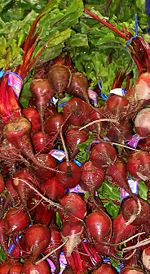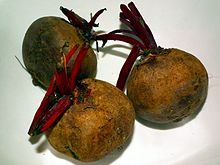 The beetroot, also known as the table beet, garden beet, red beet or informally simply as beet, is one of the many cultivated varieties of beets (Beta vulgaris) and arguably the most commonly encountered variety in North America and Britain.
The beetroot, also known as the table beet, garden beet, red beet or informally simply as beet, is one of the many cultivated varieties of beets (Beta vulgaris) and arguably the most commonly encountered variety in North America and Britain.The usually deep-red roots of beetroot are eaten boiled either as a cooked vegetable, or cold as a salad after cooking and adding oil and vinegar, or raw and shredded, either alone or combined with any salad vegetable. A large proportion of the commercial production is processed into boiled and sterilised beets or into pickles. In Eastern Europe beet soup, such as cold borscht, is a popular dish. Yellow-coloured beetroots are grown on a very small scale for home consumption.
The green leafy portion of the beet is also edible. It is most commonly served boiled or steamed, in which case it has a taste and texture similar to spinach.
Health Benefits
Beetroots are a rich source of potent antioxidants and nutrients, including magnesium, sodium, potassium and vitamin C, and betaine, which is important for cardiovascular health. It functions by acting with other nutrients to reduce the concentration of homocysteine, a homologue of the naturally occurring amino acid cysteine, which can be harmful to blood vessels and thus contribute to the development of heart disease, stroke, and peripheral vascular disease. Betaine functions in conjunction with S-adenosylmethionine, folic acid, and vitamins B6 and B12 to carry out this function.
Additionally, several preliminary studies on both rats and humans have shown betaine may protect against liver disease, particularly the build up of fatty deposits in the liver caused by alcohol abuse, protein deficiency, or diabetes, among other causes. The nutrient also helps individuals with hypochlorhydria, a condition causing abnormally low levels of stomach acid, by increasing stomach acidity.
 Beetroot juice has been shown to lower blood pressure and thus help prevent cardiovascular problems. Research published in the American Heart Association journal Hypertension showed drinking 500 ml of beetroot juice led to a reduction in blood pressure within one hour. The reduction was more pronounced after three to four hours, and was measurable up to 24 hours after drinking the juice. The effect is attributed to the high nitrate content of the beetroot. The study correlated high nitrate concentrations in the blood following ingestion of the beetroot juice and the drop in blood pressure. Dietary nitrate, such as that found in the beetroot, is thought to be a source for the biological messenger nitric oxide, which is used by the endothelium to signal smooth muscle, triggering it to relax. This induces vasodilation and increased blood flow.
Beetroot juice has been shown to lower blood pressure and thus help prevent cardiovascular problems. Research published in the American Heart Association journal Hypertension showed drinking 500 ml of beetroot juice led to a reduction in blood pressure within one hour. The reduction was more pronounced after three to four hours, and was measurable up to 24 hours after drinking the juice. The effect is attributed to the high nitrate content of the beetroot. The study correlated high nitrate concentrations in the blood following ingestion of the beetroot juice and the drop in blood pressure. Dietary nitrate, such as that found in the beetroot, is thought to be a source for the biological messenger nitric oxide, which is used by the endothelium to signal smooth muscle, triggering it to relax. This induces vasodilation and increased blood flow.Other studies have found the positive effects beetroot juice can have on human exercise and performances. In studies conducted by the Exeter University, scientists found cyclists who drank a half-litre of beetroot juice several hours before setting off were able to ride up to 20 per cent longer than those who drank a placebo blackcurrant juice.
As a dye
 Betanin, obtained from the roots, is used industrially as red food colourants, e.g. to improve the colour of tomato paste, sauces, desserts, jams and jellies, ice cream, sweets and breakfast cereals. Within older bulbs of beetroot, the colour is a deep crimson and the flesh is much softer. Beetroot dye may also be used in ink.
Betanin, obtained from the roots, is used industrially as red food colourants, e.g. to improve the colour of tomato paste, sauces, desserts, jams and jellies, ice cream, sweets and breakfast cereals. Within older bulbs of beetroot, the colour is a deep crimson and the flesh is much softer. Beetroot dye may also be used in ink.Betanin is not broken down in the body, and in higher concentration can temporarily cause urine (termed beeturia) and stool to assume a reddish color. This effect can cause distress and concern due to the visual similarity to bloody stools or urine, but is completely harmless and will subside once the food is out of the system.
It is a rich source of the element boron. Field Marshal Montgomery is reputed to have exhorted his troops to 'take favours in the beetroot fields', a euphemism for visiting prostitutes. From the Middle Ages, beetroot was used as a treatment for a variety of conditions, especially illnesses relating to digestion and the blood. Bartolomeo Platina recommended taking beetroot with garlic to nullify the effects of 'garlic-breath'.
Reference : http://en.wikipedia.org/wiki/Beetroot










0 comments:
Post a Comment